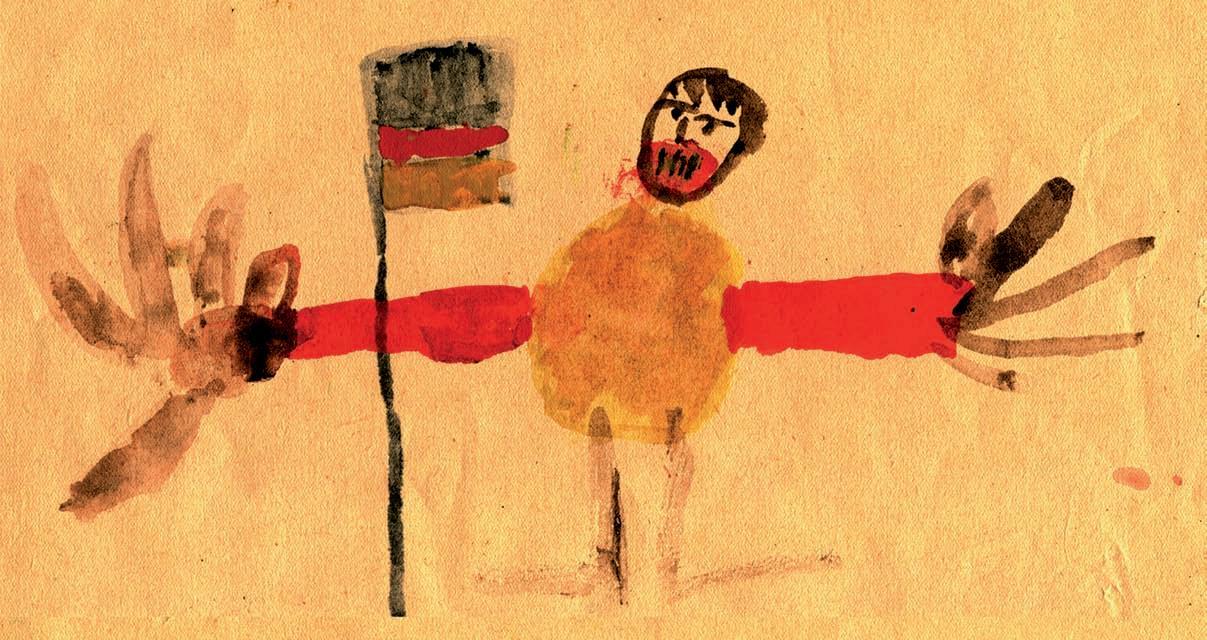
9 minute read
FILM ROUNDUP
from ICON Magazine
Heimat is a Space in Time
Heimat is a Space in Time (Dir. Thomas Heise). Documentary. In this four-hour essay film shot mostly in black-and-white, German documentarian Thomas Heise moves mesmerically through the history of his country and his family, many of whom lived through, and actively resisted, tyrannical regimes. World War I, the rise and fall of Nazism, and the Berlin Wall (both its construction and destruction) are the macro touchstones. Around this Heise explores specific tales from his ancestry, such as a series of anxiety-inducing letters from his grandmother (read over a slow-scrolling backdrop of Nazi documents containing innumerable Jewish names) or a provocative formative incident from his own boyhood in which Heise and his brother kissed each other in a darkened movie theater. The boundaries between personal and communal experience are collapsed, though never entirely obliterated. Time and again Heise reminds how difficult it is to be an individual while living among oppressively powerful forces, actual and existential. Somehow we endure—our struggles, hopefully, remembered. [N/R] HHHH
Advertisement
The Personal History of David Copperfield (Dir. Armando Iannucci). Starring: Dev Patel, Hugh Laurie, Tilda Swinton. It seems an odd fit: The acidly funny Armando Iannucci (one of the main minds behind the corrosive political satires In the Loop and The Death of Stalin) adapting Charles Dickens’s more gently satirical coming-of-age novel David Copperfield. And at first, it seems that Iannucci has succumbed to a kind of aggressive, Wes Andersonian whimsy as incidents from the life of his protagonist (Dev Patel) pile up inelegantly, at the speed of a hurricane. What emerges from this maelstrom, fortunately, is a blissful paean to language. At heart, this Copperfield is about Iannucci paying tribute to a time-honored talent who shaped his own love of words. It also boasts a cast that is splendid from stem to stern, best in show being Hugh Laurie’s absentminded Mr. Dick and Ben Wishaw’s scheming Uriah Heep. [PG] HHH 1/2
The Invisible Man (Dir. Leigh Whannell). Starring: Elisabeth Moss, Oliver Jackson-Cohen, Harriet Dyer, Aldis Hodge. Universal’s big-budget, interconnected “Dark Universe” series collapsed after a single release (the lamentable Tom Cruise vehicle The Mummy). So the studio went smaller and stand-alone with Leigh Whannell’s take on the classic imperceptible movie monster. The eponymous “Man”—an uberwealthy expert in optics, natch, played by Oliver Jackson-Cohen—isn’t really the focus. It’s his victim, abused girlfriend Cecilia Kass (Elisabeth Moss), who takes center stage, which gives the proceedings a post-#MeToo charge. She breaks out of her gilded cage in a tense opening scene, then spends most of the rest of the movie trying to convince anyone who will listen that her former beau is stalking her sight unseen. Moss is excellent as the gaslit, increasingly distressed protagonist, and Whannell orchestrates several good fright sequences, the best occurring in a crowded Chinese restaurant. By the end, though, the film’s desire for of-the-moment relevance overwhelms the well-choreographed genre thrills. [R] HH 1/2
The Wild Goose Lake (Dir. Diao Yinan). Starring: Hu Ge, Gwei Lun Mei, Qi Dao, Liao Fan. Chinese filmmaker Diao Yinan’s seedy noir is an alluringly rain-drenched fever dream, its smeary neon color palette something Michael Mann might envy. The film is told partially in flashback courtesy on-the-run gangster Zhou (Hu Ge), who works with a gang that steals and resells motor bikes, and who now has a price on his head. There is, of course, a femme fatale (Gwei Lun Mei), who plies her trade as a “bathing beauty” (a beachside prostitute), in addition to all manner of cops and criminals whom Zhou has to avoid, at least until he ensures the physical and fiscal safety of his wife. Our antihero is convinced his death is inevitable, and the air of fatalism that hangs over the movie is potent. Though it’s more likely you’ll remember the squalid ambience (a sex scene in a boat climaxes with a loogie for the ages), not to mention two shockingly graphic kills, one via umbrella! Style might be paramount here, but there is substance enough in the grubby visions that Diao conjures. [N/R] HHH 1/2 n




A.D. AMOROSI S SINCE DEAD CAN DANCE’S start in the Australian outback (OK, Melbourne) of the 1980s, multi-instrumentalist Brendan Perry and vocalist Lisa Gerrard—the ensemble’s co-founders and core—have consistently maintained mixing creakily ambient electronic atmospheres with world beat rhythms, melodies cribbed from the Renaissance and Middle Ages, Irish-Anglo folk, and often wordless Gregorian chants to create an ethereal garden of dark-wave vibes and passiveaggressive new age tones.
That may be a mouthful. Yet, it doesn’t say enough about the innovation that Dead Can Dance brought to music. The graphics, too, were innovative, especially the album covers on Britain’s 4 AD label.
From lustrous albums such as Spiritchaser, through scores for films such as El Niño de la Luna, and Gladiator—an Academy Award-winner—to its most recent efforts, Anastasis and Dionysus, Dead Can Dance continues to make daring, eerie-yet- healing music their bold and beautiful signature.
I spoke to Brendan Perry from his home in London.
I noticed that celebration is more prominent in Dead Can Dance’s later work; in the beginning things were usually touching on sorrow or existential dilemma.
I don’t know if we’re less existential, but celebratory, yes. That’s precisely what we’re doing now, celebrating our musical partnership—40 years now. One aspect of our evolution is that you can only talk about existentialist subjects for so long before you start chasing your tail.
And that of your audience.
Right. Eventually, it will all become post-absurdist. As time goes on, we’ve regularly reflected our newer musical interests and how we have evolved as artists and as people—I mean, our families have grown, we’ve settled into the fabrics of our lives. We’ve become parents. We’ve become taxpayers. Everything else that comes with real life. “Dionysus,” though it has more depth to it than this, is about celebration, and getting out it.
When “Dionysus” was released we spoke of Impressionism, and how how it was an inspiration. Will it continue to inspire you?
Yes. It’s breaking new ground. You challenge yourself—making a concept album like that, a pagan opera. That’s something where you’re pushing your envelope and going beyond all boundaries. That’s partially why I love working on new projects—that’s how you develop, move along, move forward. There’s no better way to have greater depth and acquire more skills than to take those risks.
Your solo output is as endearing and daring as the music you’ve made as Dead Can Dance.
Thanks. I’m currently working on a solo album, and will probably release that this autumn, and that is a complete shift away from what I do as Dead Can Dance. The album will be called Songs of Disenchantment, and it will be all cover versions of Greek songs from the Golden Age of rebetika [Greek folk music] from the 1930s, translated into English for the very first time, and all played on original Greek instruments. That’s a complete departure from our usual. I’m also speaking with Lisa about a future Dead Can Dance album, and it looks like it will be a classical recording along the lines of neoBaroque music.
Why has Greek culture become so integral to your and Dead Can Dance’s work?
My upbringing and education was such that Greek culture was the cornerstone of everything. The Romans were great engineers, but when it comes to philosophy the Greeks laid the bedrock for further development. I remember reading Homer’s Ulysses as a child, and was fascinated.
Songs of Disenchantment, is interesting to me because it covers a period in Greek history when they had to take in millions of immigrants from Turkey in 1922. This created a new urban music, a cross-pollination of cultures.
A cross-pollination of cultures has always been Dead Can Dance’s bag.
Exactly. Greece is right at the crossroads of eastern Asia. So the transmission of culture has been passing through, non-stop, forever. That’s still going on today. Immigration and cross-pollination—migration that will happen with the rising seas, and people will be displaced.
There are matters now of cultural appropriation—that borrowing bits of other cultures of which you are not an original part, and making those elements your own, is questionable. Where do you stand on matters of sourcing and attribution?
You must quote all of your sources. If you quote them, you are not misappropriating. That is integrally important. The thing that inspires you, you should reference and credit, In regard to music, it’s tricky. Culture is always an evolution of different strains and rivers that feed into greater, wider oceans of action and experience.
Having said that, you need to reference the original place from where you’ve come. If you’re going to plagiarize, you do it in a way that celebrates the original influence.
Dead Can Dance was born within the punk scene of Melbourne. Is there anything in the Brendan Perry of today that still has that aggression, that punk vibe, punk spirit?
That’s a tricky question because I do feel as if I carry that spirit with me naturally. I am my own creation. I haven’t changed my general outlook on the world since I was in my late teens. I’m still a bit of an anarchist at heart. I mean that in the sense of not trusting completely the ruling classes that govern us. That’s been borne out over the decades by the state that we are in now, geopolitically. It’s a real mess. Those in successive governments have landed us in this disastrous point in history—this precipice. They haven’t done anything to prevent this. Greed still rules. So my general outlook on the world, my political side, is very much anti-establishment, because the establishment has proven itself to be inadequate. That’s my punk backbone. I left home at 17 and lived with prostitutes. My girlfriend was a prostitute. I did loads of drugs, heroin, you name it. I lived on the streets. That education—after coming from a comfortable, suburban middle-class family I might add—was crucial to my development.
When did you become the man you are now?
I think when I met my wife. I was a bit of a loner—even celibate for a long time—before I met her. Yeah, that’s the completeness for me. Meeting my future wife and having a child was essential. How did that affect your music?
That’s hard to answer. I don’t think it’s anything dramatic. I’m still interested in melancholia when it comes to music, and beautiful lyrics that are straight from the heart. That hasn’t changed. Being married means being settled so that I can focus on the music. Neither dead nor dancing, yet still celebrating > 24











